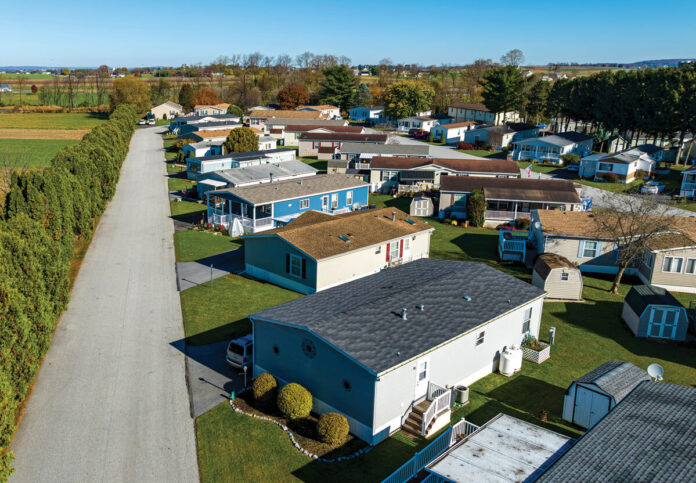By Andy Conlin

In February of 2024, I attended a subcommittee in the capacity of executive director and lobbyist for the Iowa Manufactured Housing Association. Despite large Republican majorities in the statehouse in Des Moines, the bill discussed by the three-legislator panel would allow cities and counties in Iowa to implement their own rent control requirements. While the bill failed to advance beyond the committee, this was a stark reminder that rent control is a live issue as state legislators seek ways to address housing affordability. Despite a failing rent control experiment right up the road in St. Paul, Minn., landlords and their associations will continue to see these types of measures introduced by both Republicans and Democrats.
In recent years, state legislatures across the country have taken up measures to either directly enact or allow local governments to adopt rent control measures. These legislative efforts aim to cap rent increases and, by extension, curb the escalating housing costs that have become a pressing issue for many Americans. While the sponsors of these measures often have these positive intentions, rent control distorts the rental property market, discourages investment, and does not solve the housing affordability issue.
The Rise of Rent Control Legislation
Rent control policies are not a new concept, having been part of the housing regulation landscape in various forms and capacities over the decades. However, the recent wave of legislation marks a significant shift, with states and municipalities considering or enacting laws that are more comprehensive and stringent than in the past. These laws typically limit the rate at which rents can be increased annually, tying them to inflation rates or other economic indicators, in an effort to make housing more affordable and prevent displacement. Rent control measures are not just a blue state issue. While most of the media attention has focused on rent control measures in states like Washington and Delaware, legislators across the country — including in red states like Iowa — are introducing and advancing rent control bills. Challenges for Landlords For manufactured housing community owner/operators, rent control presents several key challenges:
1. Reduced Ability to Manage Property Economics: The most immediate impact of rent control is the limitation it places on landlords’ ability to adjust rents in response to market conditions. At a minimum rent control can reduce property owners’ ability to react to inflation spikes, changing market dynamics in high-demand areas, or other unforeseen events, including unanticipated maintenance issues. Over time, this can erode the profitability for owner-operators and deter future investment in the sector. For smaller operators, rent control can make it impossible to have a profitable business.
2. Maintenance and Upgrades: With capped rental income, MHC owner/operators may find it increasingly difficult to allocate funds for maintenance and upgrades to their properties. This could lead to a decline in the quality of housing stock over time, as well as reduced incentive to invest in energy efficiency and other improvements that benefit residents, the environment, and help make housing more efficient and attainable.
3. Administrative Burdens: Rent control regulations often come with a complex web of administrative requirements, including registration, reporting, and compliance measures. These can impose significant burdens on MHC owner/operators, especially smaller operators, in terms of both time and financial resources. Compliance issues, especially for new rent control requirements, could create significant risk for owner/operators who fail to adequately meet their requirements.
4. Market Distortions: Rent control can lead to market distortions, including a decrease in the availability of rental units and MHC lots as landlords convert properties to uses not subject to rent control. This can exacerbate the affordability issues that rent control seeks to address, leading to unintended consequences such as increased competition for a dwindling supply of rental units.
5. Investment Deterrence: The prospect of rent control can act as a deterrent to investment in rental housing, both for existing properties and new developments. This is particularly concerning given the ongoing housing supply shortages in many areas. A reduction in investment can hinder the development of new rental units, further straining housing markets and limiting options for potential residents.
Navigating the Path Forward
For MHC owner/operators, the challenge lies in engaging constructively with policymakers, residents, and other stakeholders to address housing affordability while also ensuring the viability and sustainability of the rental market.
The first line of defense is state manufactured housing associations. This industry is well-positioned with strong associations across the country. While lobbyists are not magicians, a well-equipped association with a professional lobbying team, politically engaged members, and strong grassroots program can educate lawmakers on why rent control is a failed policy and how increasing the housing supply is the most economically sound path to addressing rent affordability.
Additionally, it is also critical for policymakers interested in manufactured housing to understand this sector is in transition. While “sale to an out-of-state investment group” will continue to be a key talking point for those advocating for rent control, these transactions often lead to situations where residents see much needed investment in their communities. This increases the value of their homes and often makes their communities nicer places to live and raise families.
The trend toward rent control legislation reflects a misguided attempt to address affordability and stability in the housing market. Community owner/operators in both red and blue states must be vigilant. They must communicate with policymakers either individually or through their state manufactured housing association to convey the message that rent control will lead to fewer housing opportunities, less investment in existing communities, and economic uncertainty for housing providers.
Andrew T. Conlin, a seasoned advocate with over 15 years of experience in government affairs, legislative policy and public affairs, is the executive director of the Iowa Manufactured Housing Association. He is a graduate of Purdue University with a dual degree in history and political science.
MHInsider is the leader in manufactured housing news and is a product of MHVillage, the top marketplace for manufactured homes.













